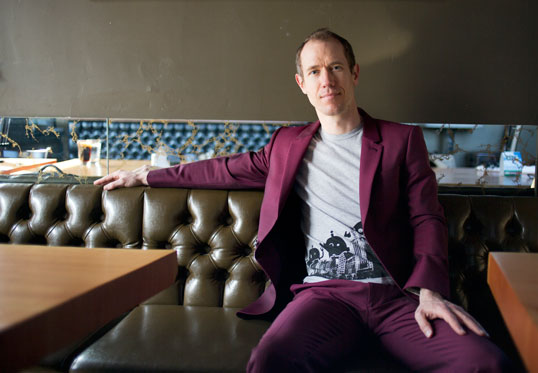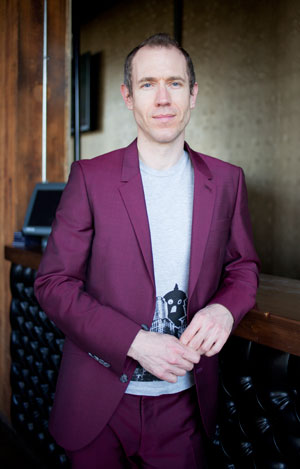
Photos by Selena Phillips-Boyle
Four words, scrawled by an English professor, changed the course of his life. You are a writer. The words blazed with transcendent implications for the young Todd Babiak, '95 BA. He imagined himself a lawyer and his plan had been to finish his BA, then go on to a law degree. If he were to be completely honest, however, he desperately wanted to believe those four words.
"I actually first wanted to be a writer in Grade 6. Every Monday we wrote in our journals. We could write anything so I wrote stories." Neither of his parents read much, but his mom loved Stephen King. Naturally, his stories veered radically into the horror genre - standard elementary school stuff: blood, gore, heroism. His teacher didn't seem to mind until he wrote about two maniacs who took refuge in his family's cottage. They massacred every member of his family until a boy named Todd saved the day. He killed the killers and, in a fantastical twist, his loved ones came back to life.
After reading his story, the teacher called a conference with his parents. Sitting through that meeting, he felt fear. The word "psychologist" was used and his parents looked serious: They thanked the teacher and took copies of his story home. Later that night, from behind a closed door, he overheard gales of laughter as his parents read his piece. His fear turned to relief, then joy. For Christmas, his parents photocopied his story as a present for everyone who had a part to play. It was his first taste of the exhilarating power that comes with the telling of an entertaining story.
These days in Edmonton, like a gopher in a prairie field, Babiak's popping up everywhere. Speaking at the Edmonton Public Library centennial. Chatting with Jian Ghomeshi on CBC's Q. He's on the board of Startup Edmonton and is the current face of Make Something Edmonton, an innovative approach to city branding. This fall, he'll be even busier as his fifth book, Come Barbarians, is released.
How'd he get here? After his BA at the University of Alberta he headed to Montreal and finished a master's degree in creative writing. He returned to Edmonton, working a variety of jobs in public and cable broadcasting before the Edmonton Journal hired him. Working as a journalist cum columnist, the paper gave him an opportunity to write his Giller-nominated second book, The Garneau Block. "The editors at the Journal pulled me into the office and asked if I was up to writing a serial novel," Babiak remembers. It was written in three months, edited then printed in weekly-serialized form.
His third and fourth books, The Book of Stanley and Toby: A Man, were written in the early mornings before he walked to work. Then, after 10 years at the Journal, he and his wife agreed that their family was ready for a big change. Quitting his job, he moved his family to France for a "sabbatical" year. He studied French, freelanced and focused on writing Come Barbarians.
He is a disciplined novelist, at his writing desk between 5 and 6 a.m. He says, "I'm probably a little OCD; I feel uncomfortable when I don't write one day. Every day I need to accomplish small goals." As a novelist, he's grown over the course of five novels, becoming more confident. "I know that if I change something critical to the plot, I can just fix it - even if it means an entire re-write."
Besides writing, in France Babiak drank a lot of wine. He visited the vineyards, "The French winemakers kept saying, 'We're not telling the story of French wine.' And they were right. The Californians and Australians have taught us all to buy wine by the grape, and it's made French wine incomprehensible to North Americans. Every French region and wine has a story. I wondered if a business could create that, the way Steve Jobs and a marketer had captured the Apple story."
His wonderings evolved into a partnership with Shawn Ohler, his former editor at the Edmonton Journal, to create Story Engine. "When we pitch our business to potential clients, it's hard," says Babiak. "What we do is weird." What he means is: it is a completely non-traditional approach to branding. Instead of starting with product samples of punchy, three-word marketing jargon, they teach clients not what story to tell, but how to tell their story - and how to use it as the core of their strategic planning.
Their client list includes companies, government departments and now, the City of Edmonton. In distilling the initial idea for Make Something Edmonton, Babiak spoke to 112 residents about what excited them about their city. To his surprise, everyone spoke about things they or their community built from the ground up: from the Fringe, to PCL, to a neighbourhood block party. Babiak says, "Edmonton is a community of makers. We don't want to be 'world class', we want to work together to make something."
Make Something Edmonton hopes to answer that question so often posed by outsiders, "Why did you choose to live in Edmonton?" The answer is a narrative one and a little hard to pin down. We know, however, what it is not. It is not a string of words chosen from an outside consultant's marketing hat (otherwise Edmonton might have launched: Innovative Awesome Industrial Capital).
Make Something Edmonton is also a call to action: What are you making? The initiative was launched, along with its website, on the evening of March 21 in the middle of a deadly spring storm. Three hundred and fifty people packed the Avenue Theatre to celebrate and anticipate what Edmonton artists, businesses and organizations make. The website is interactive. Anybody can come up with a project and invite others to join them. The site invites Edmontonians to further develop their identity as a city of "makers."
Perhaps his greatest test as a storyteller is at home. "My kids know a good story. At the end of a long day, they always want me to tell them one. Sometimes I'm tired and try to trick them with a soliloquy about how much I love them. Even the little one will stop me, 'Dad, that's not a good story.'"
Adults usually know a good story too, but for most people stories are hard to construct. Adults want to expound, exposit, postulate. Stories may convey the same points, but they are not simple exposition. Babiak says, "You need a problem, then tension. Then you need to resolve that tension in a climax and conclusion."
Story arcs are something Babiak is naturally drawn to but he's grown in his ability to shape and share them. Now he's converted this skill set into a successful day job as a novelist and entrepreneur, effectively making a job out of the liberal arts where every day presents a collision of characters, conflict and creative conclusions.
Raymond, manic professor in The Garneau Block, probably said it best, "Everyone has a need in our hearts for stories about ourselves." From his kids to his neighbours, Babiak is helping them discover where they come from, who they are and what they can become.

We at New Trail welcome your comments. Robust debate and criticism are encouraged, provided it is respectful. We reserve the right to reject comments, images or links that attack ethnicity, nationality, religion, gender or sexual orientation; that include offensive language, threats, spam; are fraudulent or defamatory; infringe on copyright or trademarks; and that just generally aren’t very nice. Discussion is monitored and violation of these guidelines will result in comments being disabled.